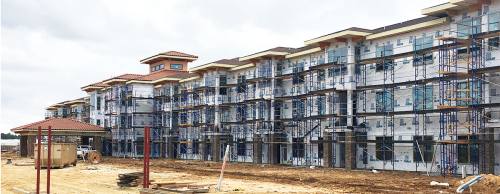The cost of living for many in Harris County continues to rise as property values increase, driving the demand for more affordable living options throughout the region, including Tomball.
Although the Tomball area contains only two low-income housing projects, a third will soon open. The Retreat at Westlock will open in February on Hwy. 249 near Northpointe Boulevard. The 140-unit apartment complex for residents age 62 and older is being built as a low-income housing tax credit property through a partnership between Harris County and private developers.
“Tomball is experiencing tremendous growth,” said Timika Simmons, director of public affairs for the Harris County Housing Authority. “This boom in the economy is driving up the cost of living so much so that we have people who have lived in an area all of their lives, but are now having to move elsewhere because they are no longer able to afford to live [here].”
Residents at The Retreat are expected to begin moving into the complex at the end of February, and rent costs will range from $390 to $936 per month, depending on income levels. Simmons said while the complex targets low income residents, it is not a public housing facility, which are are entirely low-income and Section 8 funded.
However, while some believe there is a need for the facility and for low-income housing throughout the Greater Houston area, residents living near the new development worry about what lower-income housing could mean for the area.
Demand for affordable housing
 Need for Affordability[/caption]
Need for Affordability[/caption]
Although median incomes are on the rise, according to the U.S. Census Bureau, there are still significant levels of poverty across Northwest Houston. More than 100,000 people need affordable housing in Houston alone, said Tory Gunsolley, Houston Housing Authority president and CEO.
“The [low-income housing] tax credit program is really targeted at folks who are making 60 percent of the area median income, and in Houston that is a family of three making $40,000 per year,” he said. “A lot of the backlash is thinking that these folks are fundamentally different than the people who are already in the area.”
For LIHTC properties, housing authorities need to acquire “points” to have a project approved for funding from the U.S. Department of Housing and Urban Development that is passed on to the Texas Department of Housing and Community Affairs. Points are given by several entities—including municipalities and state representatives—for a variety of factors, such as developing in areas with lower concentrations of affordable housing, according to the TDHCA.
Although incomes vary throughout portions of Tomball, thousands of residents qualify for low-income housing in the region. For example, in the 77375 ZIP code, about 23 percent of the area’s households would qualify to live in a property with income requirements like The Retreat, according to census data.
Within the Tomball city limits, two low-income properties already exist with age and income restrictions similar to The Retreat. Tomball Pines, located at 525 School St., offers rental assistance under HUD’s Section 811 Supportive Housing for Persons with Disabilities program, and The Village, located at 517 School St., which provides affordable housing for seniors age 62 and older, and qualified individuals with disabilities.
Gunsolley said low-income families do not move to the area to fill the housing projects. Instead, tenants taking advantage of those projects are already living in the nearby and surrounding region.
Simmons said the majority of applicants for housing at The Retreat already live in the area, and HCHA has also found demand for additional properties to serve more residents.
“We are also receiving inquiries from the local workforce about building a property of the same Class A standards for those working in the area like at restaurants, the schools, grocery stores, retail stores and health care facilities but are unable to afford the high cost of rents in the area and therefore are having to travel long distances for work,” Simmons said.
Opposition, benefits
Some opponents of low-income housing question the need for affordable housing projects in the area, citing concerns about crime and property values.
In summer 2015, a Change.org petition was started by residents from Westbourne, the neighborhood closest to The Retreat, receiving over 1,400 signatures. Directed toward Harris County Precinct 4 Commissioner Jack Cagle and the HCHA, the petition asked for the project to be shut down.
Requests for comment from the Westbourne Homeowners Association were not returned, however, a majority of petition signers expressed concern about rising crime rates and decreasing property values as a result of the complex.
Kay Smith, a long-time area resident and former District 130 candidate for the Texas House of Representatives, advocates against low-income housing in the Tomball and Cypress areas and said projects face opposition for many reasons.
“You get a mixture of types of residents in these complexes, and it only takes one to bring down the whole area,” Smith said.
She said issues could range from overcrowding in schools, undue burden on emergency services and the effects such projects have on flooding. However, Smith said she believes the main problem is no area residents want or need the housing.
“The system is set up so the incentive is to put the housing not in low-income areas, but to push them out in communities that don’t have people that need the housing,” Smith said.
Gunsolley said placing affordable housing options in areas with growth, high property values and highly rated schools often have the opposite effect.
“There have been studies that have been done, and studies show that tax credit housing—when it is done well—actually increases the property value,” he said. “I think this thing that folks often don’t realize is because this is heavily regulated, these developments have to be maintained at a high level. I think the apartment complexes that cause property values to go down are your D-class properties and your slumlords.”
However, Simmons said the HCHA still receives community backlash based on preconceived notions of affordable housing.
“Unfortunately, many people, even those who qualify for residency at our properties, hear the words ‘housing authority’ and assume we are all the same,” Simmons said. “This has never been the case with HCHA. There is absolutely no data showing where property values, school rankings, crime rates or communities have been compromised because of our developments.”
By serving residents already living in the area, Gunsolley said a mix of affordable housing could also serve to bring more permanent residents into the area to live, work and shop.
“There are a lot of benefits obviously for the people who live there,” he said. “These kinds of apartments have not had the level of turnover rates that a private apartment [complex] would have, so there tends to be more stability in the neighborhood and those are positive aspects.”
Legislative debate
 Qualifying for housing[/caption]
Qualifying for housing[/caption]
Smith said she worries legislation could get passed with the support of Lt. Gov. Dan Patrick this legislative session—which began in January—that could take away local input in the process of determining which low-income housing projects get built.
State Rep. Jeff Leach, R-Plano, filed House Bill 616 on Dec. 16 with the intention of removing input from state representatives when determining whether a project should move forward.
However, local lawmakers—including state Rep. Tom Oliverson, R-Cypress, who defeated Smith in the spring Republican primary—said he would oppose the kind of legislation that would remove state representative input from the process, such as Leach’s HB 616.
“I understand people need affordable places to live, and I am not opposed to that, but at the end of the day, I represent the people of this district,” Oliverson said.





